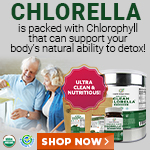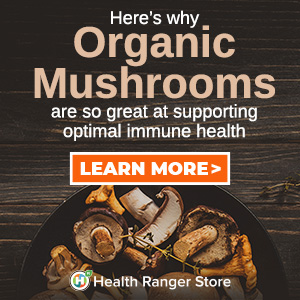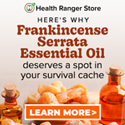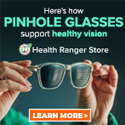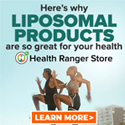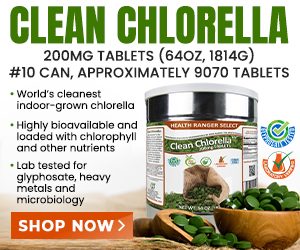
Big Tobacco and Big Pharma: same tactics, different chemicals
 Tuesday, June 07, 2005 Tuesday, June 07, 2005by Mike Adams, the Health Ranger Editor of NaturalNews.com (See all articles...) Tags: Big Pharma, Big Tobacco, pharmaceutical industry |
- Biblical truth: God will carry out a “cosmic reset” of Earth and destroy all human civilization with a series of extinction-level cosmic impacts known as The Seven Trumpets, Seven Bowls and Seven Seals
- U.S. closes controversial State Department office accused of pushing political censorship under Biden
- Russia escalates censorship war, targets over 200 VPN apps amid Google resistance
- Aerosolized bioweapons? Strange “diploid biomasses” falling out of the sky in Florida captured under the microscope
- Scientists debate possibility of TIME TRAVEL, after Trump Admin says new technologies can "bend space and time"
- U.S. demands U.K. protect FREE SPEECH, repeal hate speech authoritarianism, in latest trade deal negotiations
- “Wartime Homefront Essential Skills” on BrightU: Experts discuss foraging and 12 medicinal herbs to grow in your backyard
- Kiss Your Genetic Privacy Good-Bye! 23andMe Gets Green Light to Sell Your Intimate Genetic Details to Anyone They Want
- Widespread social and economic unrest: Steve Quayle issues urgent financial warning of imminent asset collapse in new interview with Mike Adams
- Eat your MEAT! Study finds children need to eat more animal protein for survival and development
- Trump administration halts major offshore wind project amid fears of “rushed” approvals and environmental compromises
- Possible biosignatures detected on Exoplanet K2-18b, raising hopes for alien life
- Analysis: The coming economic collapse, a mass uprising and Trump's three secret weapons to halt the growing revolt
- New York proposes blockchain integration in public payments
- Breakthrough quantum phase observed, paving the way for advanced computing and sensing
- Trump signs memorandum that seeks to prevent illegals from improperly accessing benefits
- China’s latest MAGNESIUM HYDRIDE BOMB: a new threat to global security
- Nourishing the gut to nurture the mind: How plant-based foods support children with autism
- Aerosolized bioweapons? Strange “diploid biomasses” falling out of the sky in Florida captured under the microscope
- Analysis: The coming economic collapse, a mass uprising and Trump's three secret weapons to halt the growing revolt
- Widespread social and economic unrest: Steve Quayle issues urgent financial warning of imminent asset collapse in new interview with Mike Adams
- Israeli lobbyists boast of controlling US national security policy in leaked AIPAC audio
- Kiss Your Genetic Privacy Good-Bye! 23andMe Gets Green Light to Sell Your Intimate Genetic Details to Anyone They Want
- TAKE IT DOWN Act advances in Congress amid free speech concerns
- Mike Adams releases country western hit single: Goin’ Back in Time is Comin’ Home
- Russia escalates censorship war, targets over 200 VPN apps amid Google resistance
- U.S. lawmakers investigate Meta over alleged China collaboration
- CLOT SHOT PLANDEMIC UNFOLDING: Fibrous, rubbery clots caused by covid injections have prion-like seeding activity
- Warp Speed 2.0: Trump Administration ACCELERATES Gates-funded, self-amplifying bird flu vaccines
- Defunding DEADLY mRNA jabs: Government funding for mRNA technology being scrutinized and sidelined until proven "safe and effective" for real
- Curcumin’s ancient healing power supercharges muscle recovery, and its effects are compounded with anti-inflammatory foods and supplements
- I Want My Bailout Money – new song and music video released by Mike Adams
- Fauci is back in the limelight, and he’s busy promoting a future COVID or FLU pandemic
- I Want My Bailout Money – new song released by Mike Adams
- Trump administration poised to overhaul crypto regulations with new SEC leadership
- Federal employees whine over DOGE's new directive requiring them to do a 5-point summary of weekly accomplishments
- Newly released JFK files reveal Pentagon's role in creating Lyme disease and covid in the same lab
- Analysis: The coming economic collapse, a mass uprising and Trump's three secret weapons to halt the growing revolt
- Aerosolized bioweapons? Strange “diploid biomasses” falling out of the sky in Florida captured under the microscope
- Kiss Your Genetic Privacy Good-Bye! 23andMe Gets Green Light to Sell Your Intimate Genetic Details to Anyone They Want
- Mike Adams releases country western hit single: Goin’ Back in Time is Comin’ Home
- European Court of Justice: Healthcare professionals who promoted or administered COVID-19 vaccines are CRIMINALLY LIABLE for any harm caused
- Widespread social and economic unrest: Steve Quayle issues urgent financial warning of imminent asset collapse in new interview with Mike Adams
- Federal employees whine over DOGE's new directive requiring them to do a 5-point summary of weekly accomplishments
- CLOT SHOT PLANDEMIC UNFOLDING: Fibrous, rubbery clots caused by covid injections have prion-like seeding activity
- U.S. approves new Russian ambassador as diplomatic thaw continues
- I Want My Bailout Money – new song and music video released by Mike Adams
- I Want My Bailout Money – new song released by Mike Adams
- Government waste exposed: Hegseth supports Musk’s demand for accountability from federal workers
- Trump administration poised to overhaul crypto regulations with new SEC leadership
- Defunding DEADLY mRNA jabs: Government funding for mRNA technology being scrutinized and sidelined until proven "safe and effective" for real
- Fauci is back in the limelight, and he’s busy promoting a future COVID or FLU pandemic
- South Carolina Congressman proposes new $250 bill and wants Trump on the front
- Now you can HEAR chemistry: Health Ranger translates molecules into music in stunning video demonstration that will blow your mind (and your ears)
- Red Cross issues warning to stop blood plasma donations from vaccinated people
- Scientists confirm: GENIUS brain function can be spontaneously unleashed in humans without any apparent cause
- EPA advisor admits the agency is funneling billions to climate groups ahead of Trump’s return to White House
- HYSSOP: What research reveals about the health benefits of this ancient holy herb
- Two containers with completed ballots fall out of truck in Florida
- Mike Adams releases country western hit single: Goin’ Back in Time is Comin’ Home
- Newly released JFK files reveal Pentagon's role in creating Lyme disease and covid in the same lab
- Global leaders unite to clamp down on “misinformation” with UN-backed Cascais Declaration
- BREAKING: 2025 NDAA authorizes mandatory military draft of WOMEN across America… as Pentagon pursues global NUCLEAR war with both Russia and China at the same time
- I Want My Bailout Money – new song released by Mike Adams
- Michael Yon warns of a ZIONIST TAKEOVER in Trump’s second administration
- The Health Ranger releases “Vaccine Zombie” song and music video, using AI-animated zombies for the music video
- Ozempic and Wegovy weight loss drugs are injectable LIZARD VENOM PEPTIDES that may unleash a devastating wave of organ failure… side effects align with symptoms of SNAKE BITES
- BOMBSHELL: DNA testing kits are a SCAM to develop ethnic-specific bioweapons
- Israeli soldiers accused of even more torture and abuse in the West Bank
- These 13 countries just signed an agreement to engineer a global FAMINE by destroying food supply
- RFK Jr. clears key hurdle: Sen. Susan Collins backs controversial HHS nominee, signaling a new era for health policy
- NASA admits that climate change occurs because of changes in Earth’s solar orbit, and NOT because of SUVs and fossil fuels
But let's look at other similarities. Aside from marketing products that actually kill people when used as directed, both industries are engaged in the blatant distortion of scientific evidence in order to mislead regulators and the public.
With Big Tobacco we saw the suppression of studies that said nicotine was addictive, or of studies linking the inhalation of tobacco smoke to lung cancer. In the pharmaceutical industry, we see even worse distortions of clinical studies. We see studies that are designed to minimize the appearance of negative risks associated with these drugs, such as heart attacks, stroke, mental disorders, suicide attempts, and violent behavior. Even after studies are completed, the results are highly distorted as well. Drug companies pick and choose which studies they want to publish. They may do twelve different studies on a particular drug, and if six of them say the drug is safe and effective, while the other six studies say the drug is dangerous and useless from a medicinal point of view, they pick the six they want and bury the others. They forward the six they want to the FDA. The FDA looks at those six and says, "This sure is scientific!", and they approve that drug application. I'm not making this up.
In the late 1990's, drug advertising appeared on television. That is, of course, another similarity between Big Tobacco and Big Pharma: they both use direct-to-consumer advertising to create demand for their products. For many years, tobacco companies sponsored sporting events; in fact, they still attempt to sponsor many sporting events. In the pharmaceutical industry, we see heavy magazine and television advertising, and hundreds of millions of dollars spent lobbying doctors, buying them gifts, trips (to Hawaii, believe it or not), air tickets, and stays in luxurious resorts. All doctors have to do is show up, sign in, and act like they're attending a continuing medical education course. They then can leave for the entire day, and go on the beach, go fishing, go surfing, and do whatever they want. It's an all-expenses-paid vacation.
Some people say, "No, that's ridiculous. That doesn't happen." I've actually been in Hawaii, talking to doctors who were attending such an event. I saw the entire room of about four hundred MD’s, and these people just signed in, then they left to go surfing with me! So I know how the system works, I've seen it firsthand. All the doctors out there who might be listening to this, you know how it works too. A lot of these continuing medical education courses are really just a joke.
Doctors pushed cigarettes for decades
Another interesting similarity between cigarettes and prescription drugs is that doctors have a history of supporting them both very strongly. You might say, "Wait a minute, doctors don't support smoking and cigarettes." Sure they do, if you just go back far enough. In the seventies and eighties, they began to figure out that smoking is bad for you. Before that, however, doctors could actually be found as spokespersons for cigarettes. They said that cigarettes made you healthy.You can find, in archives of old magazines like Time, that some doctors are even in advertisements stating, "Smoking, it's good for your smile". They also said smoking helps you concentrate, and that it's good for your nervous system. They made many ridiculous claims about cigarettes. We tend to forget about that today, but doctors were paid to be spokespersons for tobacco companies, and this went on for decades.
Today, of course, old school doctors are strongly in support of prescription drugs. But new doctors, the smart doctors, whom I hope you're visiting, are questioning the safety of prescription drugs. They are looking outside of conventional medicine for solutions, in terms of disease prevention and even the simple treatment of symptoms. These new doctors are noticing that people get healthier when they get off of prescription drugs. Alternatively, they use prescription drugs only as a temporary measure in order to give the patient enough time and education so that they can put into effect long term lifestyle changes that, in turn, eliminate the need for the drugs.
Of course, this frustrates the drug companies, since they want people to take these drugs for a lifetime. They claim that it's good for you, but actually, it's only good for their bottom line when you become a daily user of their overpriced product. Good doctors are recognizing that. They recognize statin drugs do have a temporary role in dealing with an acute symptom, which might be extremely elevated cholesterol that represents an immediate risk to the person's health or even life. So they may use a statin drug on a temporary basis, only for a few weeks or a couple of months at most. They meanwhile help patients undergo major, fundamental reforms in their lifestyle consisting of food choice, dietary habits, and physical exercise, avoidance of environmental toxins, lower levels of chronic stress, better sleep, better hormonal balance, and so on.
Marketing to children
Here's another similarity between Big Tobacco and Big Pharma: They both love to market to children. For years, tobacco companies have been trying to edge and wiggle their way into the adolescent market, targeting teenagers and children. They used Joe Camel, a cartoon character, to sell cigarettes, because they knew that if they could get adolescents hooked on nicotine, they had a customer for life. It's not rocket science to figure out the marketing tactic there for Big Tobacco.Pharmaceutical companies don't have the same addictive quality for their drugs. You’re not necessarily psychologically or physiologically addicted to drugs in the same way as nicotine. However, by starting a kid early on drugs, they can create a paradigm where that kid grows up thinking that he is a diseased person, and that he is that label. So if they get a kid diagnosed as ADD or ADHD, then that child will associate that label with himself or herself, and will continue on in life with the belief that they have some sort of disease or brain chemical imbalance. And they'll even tell other people, "I'm ADD" or "I'm bipolar," as if that's who they are.
That, of course, is not who they are. That's a completely fictitious label; it's been made up, and it's been placed upon them. But the trick is that by placing these labels upon these children, the drug companies know that when those children grow up, they identify themselves with those diseases, and they readily accept the idea of taking more prescription drugs as long as the doctors put more labels on them. So as they grow up, they'll find more labels, being told, "You have a syndrome X, you need this drug" or "You have high blood pressure and that's a disease, so you need this drug to lower your blood pressure." If you take a child and you get them used to the idea of associating their identity with labels of diseases, then you create a lifelong customer for the pharmaceutical industry. Big Pharma knows this, and their marketing people understand this.
Some people will do anything for a paycheck
Another interesting similarity between Big Tobacco and Big Pharma is that both are staffed by people you might consider to be ordinary, everyday people. They might be your neighbors, people that you wouldn't think would be harmful, and who aren't necessarily evil. They're just regular, everyday people trying to succeed in their jobs. Yet, they are part of a machine that is creating tremendous pain and suffering, along with destruction, disease, and distortion in our society.It makes you wonder, what kind of people would go work for tobacco companies? Who would do that? What kind of person would go work for a pharmaceutical company? Who are these drug reps? I've met a lot of these drug reps. They're everyday, nice people; people you might have as friends. Maybe you are a drug rep because you just needed a job. But I think it's important to note that there's a great tendency for human beings, when they need jobs, to set aside their ethics. They tend to dissociate themselves from the long term effects of what they are doing.
Historically, we saw this of course in Nazi Germany, where people were members of the Nazi party. They were part of a machine that was creating tremendous evil, pain and suffering, and destruction in many different ways. (I'm not talking just about the Holocaust here.)
They were part of this machine, yet they felt the need to succeed in their particular role in that machine. They dissociated themselves from the pain and suffering the machine was ultimately causing. Perhaps they saw themselves as just a cog in a big wheel. Maybe they felt like they just had no other options. I suspect that some of the same psychology is at work today in people who work for pharmaceutical companies, or people who work for tobacco companies.
But this psychological deception is harder to do today, at least when working for tobacco companies. It's hard to lie to yourself and say, "This is a healthy product." You'd have to be living in some alternate universe, where you've seen none of the science about how dangerous cigarette smoke is to human health. In the pharmaceutical industry, however, there are a lot of people who are lying to themselves, and it's easier to lie to yourself saying, "We are searching for the cure for cancer!" or "We're going to solve osteoporosis and we're going to end suffering!" They think they're part of a machine that's going to end suffering. Thus, they think if they succeed in marketing and creating more money and more profits for their company, then fund more research, they can find all these solutions to disease.
Thus, they fall for something I call "The Big Lie," which is the idea that we can solve health problems by creating ever more technologically advanced or complex synthetic chemicals and compounds that, if introduced into the human body, can suddenly reverse all of these diseases which have been created by years and years of abuse through lifestyle, lack of nutrition, exposure to environmental toxins, and so on.
The Big Lie of the pharmaceutical industry
It's a big lie that you can cure cancer or diabetes by coming up with the right chemical, or that you can even cure depression by altering brain chemistry with the right chemical. This is a big lie. It's as if medical science has gone down the wrong pathway for so long that they can't even see the fact that they're lost. They're lost in the forest, and they can't even see the trees. All they can do is continue to try to come up with more and more chemicals they think are treating these diseases.They think the only reason they haven't cured cancer yet is because they don't have enough money, that it's just a money problem. "Give us more money and in a couple more years, and we'll have cancer cured." That's been the promise they've held out for decades. The reason they think they can cure these diseases if they just have enough money and enough time is because conventional medicine remains stuck in the paradigm of germ theory. And the germ theory says that every disease is based on an organism or an invading element, whether it is a virus or bacteria, and if you just have the right chemical compound, then you can cure that infectious disease.
Of course, this was quite valid in the day of penicillin, and it's still valid today for basic, simple infections. But the germ theory does not apply to chronic, degenerative diseases such as cancer, osteoporosis, Alzheimer's disease, arthritis, diabetes, cardiovascular heart disease, Crohn's disease, clinical depression, inflammatory diseases, and so on.
Chemical-based medicine is a Newtonian view of health
That model of germ theory simply does not apply today. It doesn't mean that germ theory is false, but these chronic degenerative diseases exist in a different realm. For example, regarding physics and the laws of motion, Newtonian physics operate on a large scale; it talks about the interaction between the motion of objects and gravity and momentum. That is a very valid realm of physics and science. And it creates predictable observations and outcomes that match the mathematics. But when you go into quantum mechanics, or when you get to the subatomic level, the rules begin to change. You're now dealing with quantum physics. Quantum physics disagrees with Newtonian physics. But it doesn't mean that quantum physics is wrong, or that Newtonian physics is wrong, it's only that it's applied in a different context. The same is true with medicine.We still have the old germ theory, which I equate to Newtonian physics, trying to be applied to today's epidemic diseases, which shouldn't even be called diseases, because invading microorganisms do not cause them. They are created as a result of many different inputs, or causes that the patient undergoes, or those which the patient chooses to engage in. To call them diseases is really not accurate. Therefore, the idea that you can cure or reverse these fictitious diseases is invalid at its very premise.
Cancer is no infectious disease
The idea that you can reverse cancer by taking a synthetic chemical compound or prescription drug is, at its very core, nonsense. Because there is no such infectious disease as "cancer," there is no microbial invader. In fact, there isn't even a tissue or a physical element that you can point to and look at under a microscope and say, "That is cancer."Some people mistakenly say, "Well, sure you can. You can take a tumor out of the body, and you can put that under a microscope and call it cancer. However, that’s not cancer. That's the side effect of cancer, because cancer is a systemic failure of the immune system. It's a systemic disease. It is actually a condition. It is a lack of the body's ability to self-regulate its own cell growth, to clean up its own blood, tissues, bones, bone marrow, and so on.
This is the nature of cancer; you can't put that under a microscope and look at it. In the germ theory of disease, however, scientists are always trying to look at cancer under a microscope, where they can put it down and say, "This is the microbe, see? There's the virus" or "There's the bacteria" or "There's the parasite." They still try to do that today by saying, "Alzheimer's is based on the nervous system. Put it under a microscope and there you can see plaque. Plaque on the nervous system." They think that's the cause of the disease. It's not, it's just a side effect.
Big Pharma = big-time poverty
Getting back to the main point of this, which is Big Tobacco and Big Pharma, we were talking about why people work for these organizations when these organizations are actually doing such evil, or engaging in the creation of such pain and suffering, and even death. Here in the United States, we're also talking about economic poverty created by both of these companies.Tobacco companies make people poor, because they hook them on a product that's expensive to buy; and they have to keep buying it, because they're addicted to it. You'll notice that people who smoke tend to be on a lower economic scale. Part of that is the vicious feedback cycle; if you start smoking, you will get poorer. As you get poorer, you will continue to smoke more because life is terrible and you need your nicotine high just to feel okay. Thus, it's a downward spiral into oblivion.
Much the same is true with prescription drugs in terms of the economic scale and the loss of good, clear decision making abilities. One thing I've noticed is that when people begin taking prescription drugs, not only do they immediately suffer a big economic hit (remember that 50 percent of all bankruptcies in the United States today are due to medical bills, including prescription drugs), they also tend to lose the ability to make good decisions.
Many of these drugs, especially statin or antidepressant drugs, for example, affect people's mental acuity. They result in a loss of lucidity, which results in people no longer comprehending the big picture, and no longer making good decisions. When people can't make good decisions, they ultimately decide to allow the doctor to keep prescribing them more prescription drugs. They don't have the mental awareness to say no to the drugs. They keep taking more drugs, and they lose even more awareness. They get even less responsive, and retain less decision-making ability, and this just becomes another downward spiral.
As this is happening; they are being drained of their finances. So day after day dollars are leaving their pockets and being stuffed into the pockets of the corporate CEOs and the shareholders of the pharmaceutical companies. There's this huge transfer. Imagine dollar bills with little wings flying out of the pockets of people all around the country and flying into the corporate CEOs' pockets in the big buildings of the giant pharmaceutical companies of this country. That is happening every single day. I believe it's an exploitation of people for economic gain, for greed, by the pharmaceutical companies.
Profits first, people second
This, of course, is classic behavior that we saw from Big Tobacco. It was all about greed, it was all about marketing products. They didn't care about the resulting effect they were creating in their customers. In fact, the tobacco companies really only wanted to make sure their product didn't kill customers so fast that they lost a paying customer. They most likely didn't mind that it was giving them disease; they just wanted the customer to stay alive long enough to keep buying more product.To some degree, this mindset is still present in the pharmaceutical industry. You see this incredible insensitivity to the human condition in Big Pharma. You see press releases and memos from inside the pharmaceutical companies saying , "We can't wait for the Alzheimer's wave to come. We can sell a lot of drugs! Look at all those Alzheimer's patients out there!" Obviously I'm paraphrasing, but this is the kind of attitude we see. They look at diseases as opportunities, and that's sick! To look at a disease and how it's sweeping across the nation and affecting millions of people, and have dollar signs ringing up in your eyes and thinking, "Wow! This is great! We can make so much money selling drugs to all these people who are going to have Alzheimer's, or dementia, or osteoporosis.” That's what goes on every single day in the back alleys of Big Pharma; or rather, I should say, in the executive office suites of Big Pharma. There are no back alleys; they're doing quite well financially.
Exploiting the public for financial gain
Whether it's Big Tobacco or Big Pharma, the similarities are very obvious at this point. It's all about making money, and selling a product to people. It's about exploiting the public for financial gain, while disregarding the true effects of your company's products on the public health. That, to me, is a crime. It's not just a crime in the legal sense, but in the spiritual sense, a crime against a fellow human being. To exploit their pain and suffering for your financial gain is unethical and immoral. It's bad karma and it should be against the law.Instead, many of these companies are actually propped up today. Business magazines talk about them as great successes, and their CEOs are named as some of the most successful business people in the country. They sit on various boards, and they're influential people. I ask myself, "What great good have these people accomplished?" Nothing! Where are the cures for any of these diseases?
Where are all the cures?
I haven't seen a single cure for any disease come out of the pharmaceutical industry since insulin came out. And that doesn't even cure diabetes, although it does regulate blood sugar. So where are the cures? Where is this big turnaround in health if everybody's taking so many drugs? If drugs are so good for everybody, shouldn't we be the healthiest population in the world? Where are those statistics? Well, they don't exist!We're the most diseased population in the world, the most diseased in the history of the world. We have never seen a population this diseased, and we're taking more drugs than anybody. We're spending the most money on healthcare. We're supposed to have the greatest healthcare system in the world, yet we're the sickest!
We're the craziest in this country, too. We have more mental disorders, behavioral disorders, school violence -- we have people shooting their friends and classmates -- we have more people with dementia and Alzheimer's than we've ever seen before. So where are all these medicinal miracles? They're nowhere. The whole thing is a giant distortion and an illusion. Pharmaceuticals offer us nothing. It's just like nicotine and cigarettes. They offer us nothing other than a quick fix; nothing other than something to try to make us feel comfortable in the short term. Meanwhile, they are destroying our health from the inside out. In both cases, they're also destroying us economically.
Class action lawsuits: the downfall of Big Pharma?
The last similarity between these two companies is the class action lawsuits. Of course, Big Tobacco has fended off a lot of lawsuits. There was a Big Tobacco settlement a few years ago where the states got involved, and I think there is just such a lawsuit coming against the pharmaceutical companies.I think the pharmaceutical companies have dug their own grave. They have over-hyped, over-promoted, over-prescribed, over-pushed, and over-advertised all these prescription drugs. As a result, they now have over 40 percent of the population taking drugs. This means that as the facts start to come out about how these drugs are killing people and causing disease, and sometimes causing the very disorders they claim to treat, there's going to be a huge backlash -- a major class action lawsuit.
Most of the adults in this country will probably be involved. We've got drugs out there that are extremely dangerous, even over-the-counter drugs like non-steroidal anti-inflammatory drugs, which, by the last study I saw, are killing 16,500 Americans per year just from gastro-intestinal bleeding alone. These are the numbers from one of the drug safety researchers at the FDA. That's just one drug, one over-the-counter drug, killing 16,500 a year. I think there's a big backlash coming, just like there was against Big Tobacco.
Times are changing; people are realizing that pharmaceuticals are not safe, that they need to look beyond drugs. They need to look beyond these magic pill solutions and start taking responsibility for their own health. People are figuring out that if they go to the doctor and believe everything their doctor tells them, they'll most likely end up on one or more prescription drugs that will turn out to be unsafe years down the road, after the damage has been done. Most of these drugs are just giant experiments. And people are just guinea pigs to the drug companies. These drugs are not well tested. They're not in widespread use. All these trials have been carefully selected and constructed, but afterward they are distorted anyway. These are not safe drugs, but the drug companies know they can make enough money to fend off the lawsuits and even settle with patients, so they still come out ahead, even when their drugs literally kill people by the thousands.
But that's the big trend coming -- massive nationwide lawsuits against the pharmaceutical companies with the states and the Attorney General getting involved. People like Eliot Spitzer, a fantastic champion of protecting the public and going after corrupt corporations will play a part. We’ve got states right now suing drug companies for all kinds of billing fraud. We're talking about hundreds of millions of dollars in fraud, in which these pharmaceutical companies would just over-bill states.
I saw statistics in which some drug companies were billing states, I believe, $900 for a bottle of electrolyte solution for IVs. This should be about $20, and it's being billed at $900. It was a long list of items being overcharged. The states were shelling out this money to the pharmaceutical companies, being scammed one day after another, just like the American people are being scammed.
I say the pharmaceutical industry is the greatest con ever perpetrated on the American people. It's a huge con, and they've got everybody behind it. They've got the FDA backing it up, they've got the doctors and the medical profession, and even the medical schools and the medical journals behind it. A lot of the mainstream media as well, because the drug companies spend so much money in advertising that they can pick up the phone and talk to the editors of these big magazines and news networks. They have influence because they spend the bucks. It's a huge con and it has far-reaching implications, and its roots are deep and widespread throughout society. It's going to be difficult to get rid of this, but times are changing.
History will not judge Big Pharma kindly
Some day, Big Pharma will be looked at in much the same way that Big Tobacco is looked at today. Today, Big Tobacco is not doing so well here in the United States. What has Big Tobacco done? They have turned to the international market. The American people finally figured out that cigarettes are a dangerous product and started passing laws about not selling cigarettes to minors, restricting the advertising of tobacco companies, and so on. But the tobacco companies figured out that they can exploit other countries. "Let's go sell cigarettes in China."Guess what, the smoking rate in China is skyrocketing. They're selling a whole lot of cigarettes over there, and killing a lot of Chinese people in the meantime. We're talking about Hong Kong, China, Taiwan, Japan, Thailand, North and South Korea, Malaysia, Singapore, Indonesia, and all throughout Southeast Asia. We have a huge smoking problem and it's the American cigarette companies that are over there exploiting those populations and literally poisoning and killing those people just to make a buck, because they figured out they couldn't make their money over here in the US anymore. The game was up. They got caught red handed here in the US.
Eventually some of those other countries will figure it out too. Hopefully, we eventually won't have a tobacco industry in this country or anywhere in the world. That would be ideal. Hopefully, people don't need to inhale these deadly products.
When the backlash happens against Big Pharma, we're going to see the same thing. Big Pharma here will finally have to get creative and try to sell their products overseas. They will very likely start exploiting Asia again. There's a whole lot of people over there, they need drugs too. They'll go over there and try to discredit traditional Chinese medicine, and they will try to discredit herbs and acupuncture, just like they've done here in the US. They will create a market where they force people to have only one option for treating diseases or symptoms: prescription drugs.
The same scam worked here in the US. They convinced most people that drugs are the answer, even doctors, who are smart people. Why not try it in Asia as well? I'm sure they will. They're doing it already. They will just accelerate it as they become exposed here in the US, as people learn the truth about the dangers of prescription drugs.
A few legitimate uses of drugs
With all this talk about the pharmaceutical industry, you might say, "Mike, don't you have anything good to say about the pharmaceutical industry?" Yes, sure. It's great to have antibiotics if they're used properly, which they aren't. They're overused today. It's great to have anesthetics. If you need a surgical procedure because you've been in a car crash or you've experienced some kind of physical trauma or injury, you need anesthetics. You need antibiotics during that surgery. You need this technology to help put you back together physically.Traditional, organized Western medicine has a place. I don't deny that. Even prescription drugs can have a place if used temporarily, only for short term treatment of acute symptoms and acute conditions, and only when paired with education and lifestyle changes that can help that patient eliminate the very causes of the conditions that created that disease in the first place. The pharmaceutical industry does have a place; but frankly, it's only justified role in society is maybe something like one-twentieth of its current size. We don't need 40 percent of the population taking pharmaceuticals at any one time, we only need about 2 percent. The other 38 percent should be on nutritional healing programs. They should be on lifestyle changes, strength training, physical exercise, exposure to natural sunlight, and consumption of fresh water on a more regular basis. They also need healing foods and healing therapies. They don't need drugs.
Where is the shame of doctors?
Doctors will some day look back on this and they will be embarrassed that they supported prescription drugs for so long. They will be embarrassed in the same way as they are today about the truth that they promoted cigarettes. No doctor is proud of being associated with a profession and with an American Medical Association that has actually promoted these things in the past. The American Medical Association has even been convicted twice in the federal courts of conspiracy, for conspiracy to discredit chiropractic medicine.This is a history that doctors shouldn't be proud of. Perhaps a lot of them don't even know this history, but this is the real history of medical doctors in this country. In the future they will look back to today and say, "We are ashamed that we promoted all of these drugs, that we prescribed them without teaching patients how to be healthy. We are ashamed of our profession, and it's time to make some changes." They indeed should be ashamed, because right now old school medical doctors are doing tremendous harm.
The first rule of medicine: Do no harm. That has been forgotten, because every time a doctor sees a patient, spends three minutes with that patient, writes a prescription, and sends them out the door to go to the pharmacy, that's doing harm. That is irresponsible medicine. In fact, it is not even healing at all. It's not even being a doctor.
The word "doctor" means "teacher", according to the Latin root. Where is the teaching in our doctors today? It's not present, except in the really great doctors. But by and large, the run-of-the-mill general practitioners are not teaching anybody anything. They're writing prescriptions and getting them out of the office.
Some say, "We don't have time to teach people." Then, what are you doing? What are you doing as a doctor? What are you doing in this profession if you don't have time to help people? Didn't you get into medicine because you wanted to help people? Stop wasting your time being a slave of the drug companies. You will be embarrassed about that some day, believe me; instead, go study naturopathy. Go learn nutrition. Go help people in meaningful ways. Don't be part of the machine that is causing pain, suffering, destruction, and death in our society and around the world right now. That machine is set up for one purpose, which is financial profit. Refuse to be part of that machine.
Just say no to prescription drugs
For the rest of us, we can cause the vanishing of both Big Tobacco and Big Pharma by simply not purchasing their products. We can go somewhere else, we can do something different. We can use homeopathic remedies or acupuncture to treat our acute systems. We can use nutritional healing and lifestyle changes to prevent chronic disease so that we don't become a patient in the first place. We won't suffer from Alzheimer's and dementia and these so called "aging diseases," which really have almost nothing to do with aging; but modern medicine loves to describe it that way to try to make you think it's inevitable.We can make these changes. We don't have to be a customer of organized medicine. We can say "No" to cigarettes; we can say "No" to prescription drugs. We can find alternatives. I encourage you to take responsibility for your own health, to seek out those alternatives and use them. Don't be a victim. Don't be exploited by tobacco companies or pharmaceutical companies just so that you can make their CEOs rich at your expense.
Big Pharma at FETCH.news
Get independent news alerts on natural cures, food lab tests, cannabis medicine, science, robotics, drones, privacy and more.
 About the author:Mike Adams (aka the "Health Ranger") is a best selling author (#1 best selling science book on Amazon.com) and a globally recognized scientific researcher in clean foods. He serves as the founding editor of NaturalNews.com and the lab science director of an internationally accredited (ISO 17025) analytical laboratory known as CWC Labs. There, he was awarded a Certificate of Excellence for achieving extremely high accuracy in the analysis of toxic elements in unknown water samples using ICP-MS instrumentation. Adams is also highly proficient in running liquid chromatography, ion chromatography and mass spectrometry time-of-flight analytical instrumentation.
About the author:Mike Adams (aka the "Health Ranger") is a best selling author (#1 best selling science book on Amazon.com) and a globally recognized scientific researcher in clean foods. He serves as the founding editor of NaturalNews.com and the lab science director of an internationally accredited (ISO 17025) analytical laboratory known as CWC Labs. There, he was awarded a Certificate of Excellence for achieving extremely high accuracy in the analysis of toxic elements in unknown water samples using ICP-MS instrumentation. Adams is also highly proficient in running liquid chromatography, ion chromatography and mass spectrometry time-of-flight analytical instrumentation.
Adams is a person of color whose ancestors include Africans and Native American Indians. He's also of Native American heritage, which he credits as inspiring his "Health Ranger" passion for protecting life and nature against the destruction caused by chemicals, heavy metals and other forms of pollution.
Adams is the founder and publisher of the open source science journal Natural Science Journal, the author of numerous peer-reviewed science papers published by the journal, and the author of the world's first book that published ICP-MS heavy metals analysis results for foods, dietary supplements, pet food, spices and fast food. The book is entitled Food Forensics and is published by BenBella Books.
In his laboratory research, Adams has made numerous food safety breakthroughs such as revealing rice protein products imported from Asia to be contaminated with toxic heavy metals like lead, cadmium and tungsten. Adams was the first food science researcher to document high levels of tungsten in superfoods. He also discovered over 11 ppm lead in imported mangosteen powder, and led an industry-wide voluntary agreement to limit heavy metals in rice protein products.
In addition to his lab work, Adams is also the (non-paid) executive director of the non-profit Consumer Wellness Center (CWC), an organization that redirects 100% of its donations receipts to grant programs that teach children and women how to grow their own food or vastly improve their nutrition. Through the non-profit CWC, Adams also launched Nutrition Rescue, a program that donates essential vitamins to people in need. Click here to see some of the CWC success stories.
With a background in science and software technology, Adams is the original founder of the email newsletter technology company known as Arial Software. Using his technical experience combined with his love for natural health, Adams developed and deployed the content management system currently driving NaturalNews.com. He also engineered the high-level statistical algorithms that power SCIENCE.naturalnews.com, a massive research resource featuring over 10 million scientific studies.
Adams is well known for his incredibly popular consumer activism video blowing the lid on fake blueberries used throughout the food supply. He has also exposed "strange fibers" found in Chicken McNuggets, fake academic credentials of so-called health "gurus," dangerous "detox" products imported as battery acid and sold for oral consumption, fake acai berry scams, the California raw milk raids, the vaccine research fraud revealed by industry whistleblowers and many other topics.
Adams has also helped defend the rights of home gardeners and protect the medical freedom rights of parents. Adams is widely recognized to have made a remarkable global impact on issues like GMOs, vaccines, nutrition therapies, human consciousness.
In addition to his activism, Adams is an accomplished musician who has released over a dozen popular songs covering a variety of activism topics.
Click here to read a more detailed bio on Mike Adams, the Health Ranger, at HealthRanger.com.
Take Action: Support Natural News by linking to this article from your website
Permalink to this article:
Embed article link: (copy HTML code below):
Reprinting this article:
Non-commercial use OK, cite NaturalNews.com with clickable link.
Follow Natural News on Facebook, Twitter, Google Plus, and Pinterest
Science News & Studies
Medicine News and Information
Food News & Studies
Health News & Studies
Herbs News & Information
Pollution News & Studies
Cancer News & Studies
Climate News & Studies
Survival News & Information
Gear News & Information
News covering technology, stocks, hackers, and more



"Big Tech and mainstream media are constantly trying to silence the independent voices that dare to bring you the truth about toxic food ingredients, dangerous medications and the failed, fraudulent science of the profit-driven medical establishment.
Email is one of the best ways to make sure you stay informed, without the censorship of the tech giants (Google, Apple, Facebook, Twitter, YouTube, etc.). Stay informed and you'll even likely learn information that may help save your own life."
–The Health Ranger, Mike Adams

















